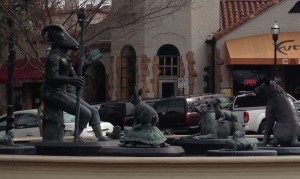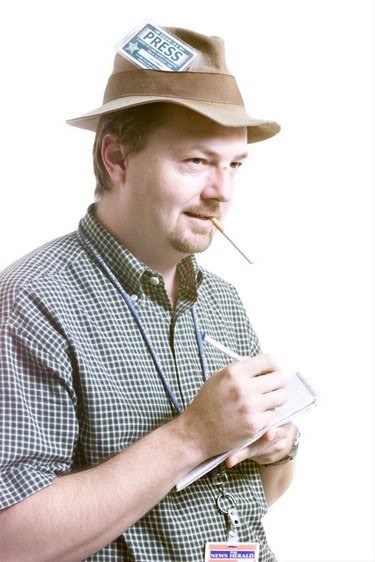
Guest contributor: Tony Simmons
Signs and Portents Along the Way
categories: Bad Advice / Cocktail Hour
2 comments
BIRMINGHAM, Alabama — We journeyed to the City of Iron recently to visit an ailing relative at UAB hospital, and this flatlands boy had to get used to hills again. Everywhere I turned was a reason to recalibrate my expectations. Bundled in heavy coats and scarves, we walked quite a bit, leaving the hospital to go to the place we overnighted, or seeking out dinner or a pharmacy, or just to see what was over the next hill.
The oaks were bare, the magnolias dark with winter coloration. As he has for decades, “The Storyteller” read to a peaceable kingdom of bronze animals in the fountain at Five Points South.
 One night, we mounted the rise to the overlook park at the foot of the statue of Vulcan, gazing out over the city lights. We photographed Quinlan Castle, joking that it was “HAB,” or “Hogwarts at Birmingham.”
One night, we mounted the rise to the overlook park at the foot of the statue of Vulcan, gazing out over the city lights. We photographed Quinlan Castle, joking that it was “HAB,” or “Hogwarts at Birmingham.”
The hills, which had been sliced through for the interstate’s construction, showed us their granite innards, here white with frozen groundwater, there red with the rust of iron.
During a period sitting in the hospital, I browsed for Kindle books and followed a rabbit trail into the steampunk category. The depictions of alternate timelines replete with clockwork and steam-driven technology somehow melded with the iron ore in the very roots of the city as well as the thick sense of history in the atmosphere and architecture.
As happens when I feed my brain new data, it began to run amok.
On the drive home, passing signs just like the ones we had seen on the journey northward, strange associations began to form. We passed a sign pointing to the exit for two nearby towns, Jemison and Thorsby, and I said to my wife, “That’s a great character name. ‘Jemison Thorsby,’ a reporter for the Confederate Statesman newspaper out of Atlanta in 1870, two years after the Civil War ended in an uneasy truce.”
I recognized a story coming to life, a steampunk adventure set in an alternate late-19th century South.
Soon, we passed a sign for two more towns. “Clanton Montgomery,” I said, joining them. “Former colonel in the Alabama militia. Hero of the Battle of Birmingham. Now a soldier of fortune operating out of the Republic of Texas.”
The journey through the storyline continued all along our return trip, as characters and situations presented themselves in the names of places like Legrande, Coosada, Cleo, Wetumpka, Ada and Rutledge. On one hill, a gigantic battle flag was displayed over a sign for the Sons of Confederate Veterans. A small church’s marker proclaimed the congregation as “Repairers of the Breach.”
 The sunset was fiery red as we passed through a string of small Alabama towns, and I read the portents in the sky, the signs on the roadside, and took hints from songs on the iPod. I could imagine their voices, their costumes, their relationships in this new frontier where four nations maintained a tenuous peace. I saw them coming together to face a common foe in the white sands and badlands.
The sunset was fiery red as we passed through a string of small Alabama towns, and I read the portents in the sky, the signs on the roadside, and took hints from songs on the iPod. I could imagine their voices, their costumes, their relationships in this new frontier where four nations maintained a tenuous peace. I saw them coming together to face a common foe in the white sands and badlands.
“Coosada Wetumpka,” I thought (as by this time my wife was trying to nap). “A Creek Indian. Father was a Red Stick warrior. He works for Montgomery, and is on the train from the free port of New Orleans to Port Arthur when he meets Thorsby.”
I thought about Thorsby more. He’s a reporter, dispatched to get the story on Montgomery, who has been making expeditions into the Plains Nations, where the tribes are armed with electrostatic weapons, dirigibles, and steam-powered cannon-carriages to keep the interlopers off their lands. They have a mysterious benefactor that is designing these breakthroughs, and the U.S. government is secretly bankrolling Montgomery’s excursions.
On the train, Thorsby sees a beautiful black woman in the company of two white men. She is clearly rich, clearly a free woman, but one of the men is threatening her. The woman glances at Thorsby on several occasions. Later, in the dining car, Thorsby sees the man slap the woman, and he goes to their table to warn the man not to strike a lady. She speaks to him in a lyrical French accent, “I do not require your assistance, little man.” I could hear her voice in my imagination.
Only then does he recognize her. But what is her name?
A moment later, I passed a sign for a place called Legrande. That’s certainly French-ish. So her name is LeGrande, but that’s only a stage name. What’s her first name? What’s her real name? I pass a sign for a place called Cleo. Her stage name is Cleopatra LeGrande, she’s a famous chanteuse, the toast of Paris, but he knew her when they were children. She was a house servant at the same estate where his father was a stable hand. Her name was…
I passed a sign for a place called Ada. He knew her by that name in their childhood, and he would often offer to help Ada with her chores, but she would always say, “I don’t need your help, Little Man.”
So what happens when they reach Port Arthur? And then onward to Beaumont, and all across to Amarillo? What happens when they cross the border into “Injun Country,” as Wetumpka sneeringly calls it, and they face the dirigible fleet of the United Tribes under the command of Touch the Clouds (a character who I had in mind, but not by name until I happened to do a search for “native American leaders” and found a list on Wikipedia)?
What otherworldly monstrosity waits in Roswell? What is “the Breach” and why must it be “Repaired”?
And that is how a new story begins to take shape in my head. New data, new environments, new ideas change the way we see and think about the world.
Maybe you have a story waiting to be told, waiting for the right stimulation to overcome the mental inertia you don’t even know is holding you back.
Peace.
 Panama City Beach, Florida, writer Tony Simmons is at that awkward age: too old to screw around with the Spring Breakers and too young to flock together with the Snowbirds. You can find out more about him and his books at TonySimmons.info.
Panama City Beach, Florida, writer Tony Simmons is at that awkward age: too old to screw around with the Spring Breakers and too young to flock together with the Snowbirds. You can find out more about him and his books at TonySimmons.info.


I dig that too! Plus The Storyteller…and the sunset. Really nice writing. I enjoyed the entire ride. Supremely love that awkward age. And no worries on those Spring Breakers–all that puking…
This article is a great example of why I read Tony’s work. He soaks up the world around him, drops it into his mental mixing bowl, and unleashes his formidable imagination. I dig that.